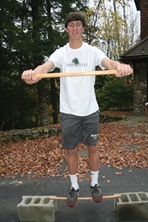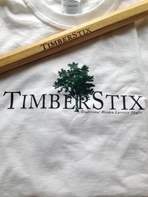From the time that Cortland Begor was selling lemonade in his front yard or reselling old textbooks and novels for a few dollars, he’s had a knack for business.
Now a 19-year-old high school student in New Hampshire, Begor has combined his two loves — lacrosse and business — and created a company that he hopes will change the sport.
Begor’s company is TimberStix Lacrosse, which makes wooden shafts for lacrosse sticks. He’s been selling the wooden shafts out of the trunk of his car to friends and competitors for the last few years, but this past fall he decided to formalize the process.
 |
Cortland Begor makes all of TimberStix’s wood lacrosse sticks, in addition to playing on Proctor Academy’s team. Managing the fledgling business gets more challenging next year when he heads to college.
Photos by: COURTESY OF CORTLAND BEGOR (3)
|
Begor, a senior at Proctor Academy, a boarding school in Andover, N.H., reached out to the school’s chief financial officer, John Ferris, who has a background in starting companies. Begor hoped to tap into Ferris’ entrepreneurial know-how. Another family friend, Morgan Salathe, assisted with Web design.
The result was an independent study class with Begor serving as the lone student and Ferris as the instructor. The mission of the class was to start a company — TimberStix.
“I’m a kid, so I wasn’t really sure how to get started or who I needed to talk to,” Begor said. “What I knew was that my friends really liked the wood sticks and that maybe I had a niche.”
Most manufacturers make the shafts of lacrosse sticks from a type of metal alloy. Neither one of the main professional leagues, the indoor National Lacrosse League nor the outdoor Major League Lacrosse, play with wood sticks. Mostly, wood sticks are found at the high school and recreational level.
Sticks made from wood mostly have been
viewed as a vintage product with limited appeal for the high-performing players, but Begor thinks that commonly held view is changing. He sees more and more competitive players using wood on the travel circuit.
Part of Begor’s independent study class required him to develop a brand position in the marketplace for the product. He’s also trademarked his company name and logo — “Got Wood.”
“One of the questions Cortland had to answer was how to position this product,” Ferris said. “What started out as more of a traditional lacrosse product has changed into a high-performance stick. That will enable him to go after the college and high-end high school players that want it.”
Begor, whose family lives four hours away from Proctor in Connecticut, started making the wood sticks as a young teen in his family’s wood shop with his older brothers.
At first, it was just a hobby. Begor would find wood from a local sawmill, shape it, sand it and put a finishing coat on it so the wood wouldn’t swell or split. It takes him about 15 minutes to make a shaft, but he now works in bulk, making several at a time. The wood shafts, made from locally harvested ash, sell for $37.99 on his website, TimberStixLacrosse.com, which is a less expensive price point than his competition.
Wood sticks typically offer a different feel than alloy, Begor said. While alloy is often lighter, the weight of the wood shafts deliver more punishing hits to the opponents when they’re checked with the stick.
Begor, who plays well enough to be recruited for lacrosse by Boston College, Dartmouth and others, simply knew that his friends liked the wood.
“It’s got a unique feel that’s hard to describe,” Begor said. “My product is designed, produced, marketed and sold by lacrosse players, so I think there’s an authenticity to it.”
TimberStix is not the first company to market with wood sticks. Easton, Hikstik, Blue Magic and Blackfeet are among the manufacturers selling wood sticks now, so Begor is entering an increasingly competitive marketplace, where sales are almost exclusively made online.
“All you have to do is give Cortland a seed of an idea and he will run with it,” Ferris said. “He’s got a niche business that can be profitable and he’s doing it all himself, from manufacturing to sales and marketing.”
Finding enough time to manage his academics, athletics and run a business has been among Begor’s chief challenges.
In addition to playing lacrosse, he’s a highly competitive alpine skier. In fact, he went to Proctor for its skiing. The International Ski Federation has a training facility on Proctor’s campus. He’s at times been forced to take business calls on the slopes.
The balancing act will only become more challenging next year when Begor goes to college.
That’s led him to look for ways to help the business mature. He’s seeking to outsource manufacturing so that Begor isn’t personally making all of the sticks. He’s also talking to retailers that might help distribute his product online and in brick-and-mortar stores. Right now, all sales are made on the TimberStix website or by Begor himself.
For this summer, he’ll still be a one-man show. He intends to travel the country after graduation, selling TimberStix out of the trunk of his car at youth lacrosse tournaments. He sold more than 500 shafts that way last summer at six different events.
“The hardest part has been just finding ways to put the product in consumers’ hands,” said Begor, whose parents have helped provide resources during the startup. “But I love the idea of the company and trying to make a statement for lacrosse. I think there’s a real movement to wood.”






